Caring for quail is relatively easy and simple as these birds are very small and they can be easily kept with other small birds. Quails are also very good as pets and they are great company.
They are wonderful to watch and they also lay delicious eggs almost everyday as well. Quails are small birds and they require less space as compared to other poultry birds. You can even raise some quails in your small back gardens that are not suitable for raising chickens.
Why Is Caring For Quail Important?
Caring for quails is very important for many reasons. Proper and good care ensures that the quails stay healthy and thrive well. Their good caring includes providing them with a suitable living environment, nutritious food, and clean water.
Taking good care of the quails also help to maintain their welfare and prevent suffering. Good caring can also help quails to express natural behaviors and live comfortably.
Caring for quail is also very important for those who raise them for eggs, meat, or simply as pets. Healthy quail are more productive and provide better-quality products. However, caring for quail is very important for their good health, well-being, and productivity.

Caring For Quail
People have many reasons for raising quails. They are smaller sized birds, interesting-looking and they don’t need to be kept in a large area. But you must know the steps of caring for quail, whether you raise quails for meat or for eggs. Quail breeders actually recommend keeping these birds in large cages. Here we are describing more about the steps of caring for quail.
Step 1: Provide Good Housing System
First of all you have to build a suitable house for your birds. Quails are smaller sized birds and they require pretty less space as compared to other poultry birds. Try to keep your birds safe from predators. Rats are actually a problem to quail, and the first thing you should consider when thinking about raising quail as pets is their security in their runs and housing.
Proper ventilation system is also mandatory, because quail droppings produce far more ammonia than other poultry. Quails can be kept with or without a run as long as they are provided with a little grass or other greens in their diet. If you have rabbit hutches, then you can use the hutches for raising quails.
Rabbit hutches are actually big enough for housing around half a dozen quail, and such hutches provide adequate ventilation and provide the birds a good place to hide to lay eggs. But chicken houses are not good for raising quails.
Quails require special care during winter and summer season. Special caring for quail is very important during the winter season, and provide bedding for them. Using pine shavings, sand, grass pellets, newspaper pellets, non-skid kitchen draw liners, Timothy and fir wood chips are good for their habitat bedding.
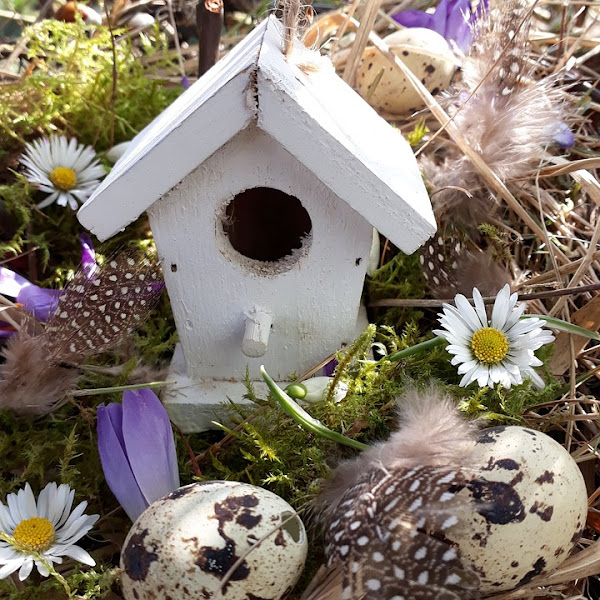
Giving the birds some hay/straw to make their nests is highly recommended. Doing this will encourage them to start laying eggs and they may even want to have some chicks. You can also purchase ready-made quail cage from the market for your birds.
Step 2: Purchase Essential Equipment
Like many other domestic birds, quails also need some equipment/items for keeping them healthy and happy. Some essential items/equipment that they require are listed below.
- Water Container: As quails are smaller sized birds, so they require small water container. The container should not be too deep or big so that they can have easy access to it and not be in danger of drowning. Always try to keep enough clean water in the container.
- Feeder: Keep adequate number of feeder as per the number of total quails. The birds should be able to get to the feeder easily as well as the water container.
- Small Plants: Growing or potting a couple of plants in the housing will make your quails very happy, if your birds live on dirt or grass. Remember, quails are curious and love different types of plants in their habitat, just make sure the plants aren’t toxic to them.
- Hiding Spots: Your quails will love hiding spots. You can purchase a couple of large hamster huts and place them in the cage.
- Sand Tub: Dust bath is very important for quails, and they generally love dust bathing on a daily basis. Sand is also very effective for preventing annoying parasites such as mites. Keep the sand tub away from the water container, as they make a mess when they dust bathe.
Step 3: Choose Right Breed
There are a lot of different quail breeds available throughout the world. Generally Japanese, Button, Chinese-Painted and Jumbo Bobwhite quail can be found from breeders and hatcheries. Choose your desired breed depending on your need and purpose. The Japanese quail is the most popular and this breed is thought to be the best breed for beginners. Japanese quails are easy to take care of, lay good eggs and also very good for producing meat.
The Bobwhite quail is good for breeding and meat production purpose. The Button quail is very small in size. This breed is generally raised for meat or eggs due to their small size. The Button quail is very good for breeding purpose and they are also kept for their beauty. Choose breed wisely depending on your purpose. You can purchase from any of your local breeders or from a nearby pet shop.
Step 4: Ensure Adequate Nutritious Feeding
Adequate nutritious feeding is another important part of caring for quail. Feed your birds with different types of food in accordance to their age. Feed the young birds with high protein starter crumb. Non-medicated turkey starter crumb is ideal for them, because such food is higher in protein than chicken crumb.

Change their food to a grower or finisher ration from their 5-6 weeks of age. If you plan for keeping quails for breeding purpose then feed the birds with 18-20 protein enriched food by their 10 weeks of age. Along with proving such nutritious foods, you should provide your birds with grass and other leafy greens for them.
Step 5: Clean Their Cage Regularly
Clean the cage of your quails after every 1 or 2 weeks of age. Cleaning the cage will help to prevent bacteria, mites and diseases. You also should dispose of all bedding hose the cage down, rinse the feeders and water container, replace the tub with fresh sand and refill the feeder and water container with fresh food and water.
Step 6: Provide Adequate Lighting System
Ensure proper lighting period for your birds. The quails can only have up to 15 hours of light per day, otherwise they will not be able to sleep. Quails need plenty of sleep to stay healthy, active and overall fun birds. Don’t leave any lights on or at least move the quail to a dark room so that they can sleep properly.
Step 7: Keep the Environment Calm
Try to keep the environment calm. Keep noisy or dangerous pets out of the same room as the quail. Because noisy pet in the room can disturb the quail and cause stress.
Step 8: Collect Eggs Daily
For ensuring fresh eggs, you should collect the eggs once everyday, especially during the hot days. You can either put the eggs in the fridge or in an egg carton and leave them on the side. Keeping the eggs in fridge will keep the fresh for a longer period of time. On an average you will get about 5-6 eggs per week from a female quail.

Step 9: Inspect Your Quail’s Health Regularly
Always try to inspect your bird’s health. Keep an eye on your bird’s health. If your birds seem to be acting a bit unusual or are not eating properly then it’s probably because the quail is unwell. You can either call a vet or fix yourself. You can fix some small problems by yourself. If your birds are huddled up in the corner of the cage then either your birds are ill or is cold.
If the birds are cold, then take them out of the cage and place them in a warm box or something alike. But if your birds are ill then you can take them to a vet. Mite is a major problem for the quails. You can treat your bird by either giving them a good dust bath, buying some mite power or any other safe method that gets rid of quail mites.
Your birds can also be injured sometimes. This is not some sort of illness, but it can be serious. You should remove the injured birds as soon as possible and keep them separated in a separate enclosure until they are fully healed. Quails also can’t tolerate excessive hot temperature. You can move your birds to a cooler room, provide them with shade or take the heat source away.
Step 10: Taming
Taming fully-grown quail is hard, but it can be easy if you handle your birds from a young age. Taming the young ones is not too hardy. You can grab them occasionally or play with them for a little while. You have to offer your birds food from your hands, visit them often and be very gentle to them for taming your quails.
Step 11: Clipping
Quails are excellent flyers and they can fly very high when frightened. If a quail can escape then it’s very hardy to catch it. You can clip the quail’s wings so that the bird can’t fly away from you.
Step 12: Take Special Care
Along with above mentioned tips consider following these special caring methods.
- Do not add different aged quails to your flock. You should either keep young or adult or both in separate room.
- You can raise younger quails first, and then older.
- Clean feeders and water container on a regular basis. Cleaning at least once per week will be good.
- Do not feed your birds with moldy feeds.
- Do not crowd birds in pens.
- Keep adequate number of feeders and water container inside the cage or house. And ensure that your birds always have feed and clean water.
- Control insects, wild birds and rodents.
- Quarantine any quail returning to your farm after an exhibition or for any other reason.
- Practice smart biosecurity, such as removing sick or dead quail from the pen immediately. Do not allow visitors who have come from other poultry farms. And also do not share equipment with other poultry farmers.
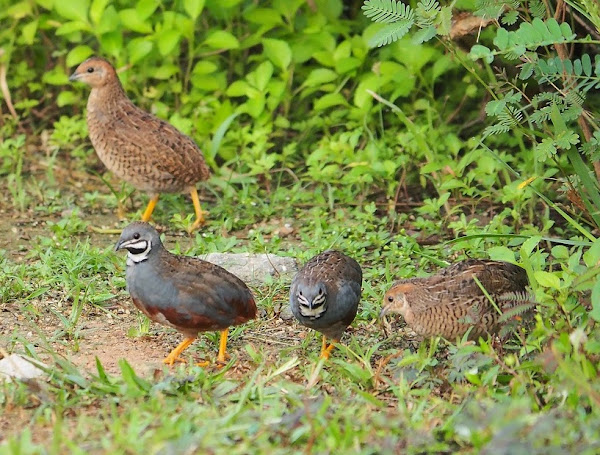
These are the common ways of caring for quail. If you are planning for starting quail farming business then follow these steps very carefully. Try to purchase healthy birds, make good house for them, provide them nutritious food, ensure good bedding and finally always try to take good care of your birds. 🙂
Frequently Asked Questions (FAQs)
People ask many questions about caring for quail. Here we are trying to list the most common questions about caring for quail, and trying to answer them. Hope you will find your answer. Don’t hesitate to ask us if you have more questions.
What are the steps of caring for quail?
Caring for quail is relatively simple, because quails are low maintenance birds. The best steps for caring your quail birds include selecting a good location, building a good and comfortable housing for your birds, arranging nesting facilities inside their house, feeding them good quality food, providing required medications, ensuring plenty of space is available inside their house, keeping their environment clean and dry etc.
Are quails high maintenance?
No, quails are not high maintenance. They generally require less caring and other management as compared to many other poultry birds. They are very low maintenance and are inexpensive to raise.
How much food a quail consume daily?
Depending on the breed, a mature quail consume around or up to 15 grams of food daily.
How often should quails be fed?
You should feed your quails twice a day.
What do quails need inside their cage?
Quails generally require some basic materials or instruments inside their house. Common things are feeder, water container, nesting boxes, sand tub, small plants etc.
Do quail like to be held?
Yes, they often like to be held. And quails often quick to tame and can be handled easily than many other domestic poultry birds.
What bedding is best for quail?
Pine shavings is considered best for the purpose of bedding for quails.
Do quail eat kitchen scraps?
Do quails need dust baths?
Yes, frequent dust bathing will helps to maintain an optimum amount of oil on the feathers.
How often do you clean a quail cage?
You should make a schedule for cleaning the quail cage. You can clean the cage once a week or bi-monthly.
How many hours of daylight do quail need?
14 ti 16 hours of lighting period will help and increase the birds to lay more eggs.
What is the best thing to feed quail?
For commercial production, you can feed your quails with ready-made or commercial poultry feeds. Different types of grains, seeds, grass seeds are considered good for the quails.
What should you not feed quail?
You should not feed your quails with such food which are toxic to them. Common foods for quail to avoid include chocolate, grape seeds, caffeine, avocado, rhubarb, meat, parsley, leaves and stems of tomato plants, uncooked potatoes, salty food, most of the citrus fruits etc.

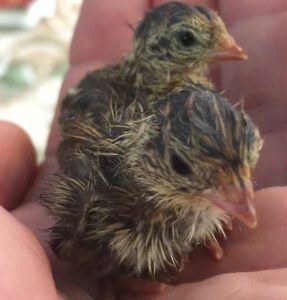
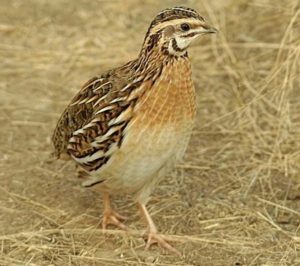
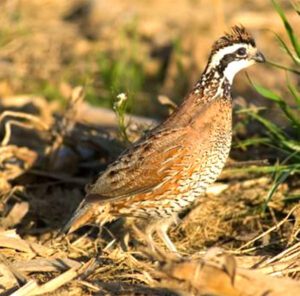
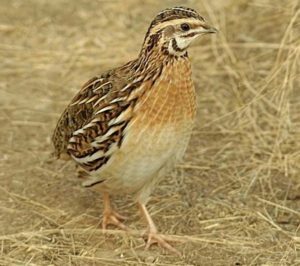
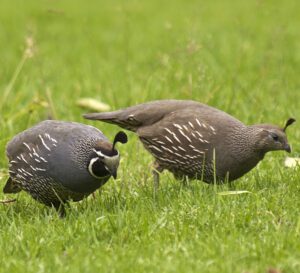
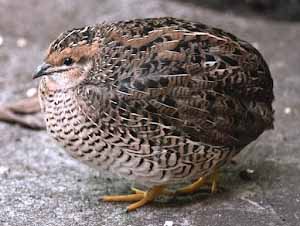
Question
So my gf has recently received two quail as a pets and she not I have the first clue what’s best for them . These articles help but I have a question on housing. If the bird are jump into the top of the cage it’s time for a bigger cage correct?
Thanks for the great advice here!
thank you for sharing this information. i will follow this for caring my quails. right now i have 24 japanese quails but they are not laying enough eggs.